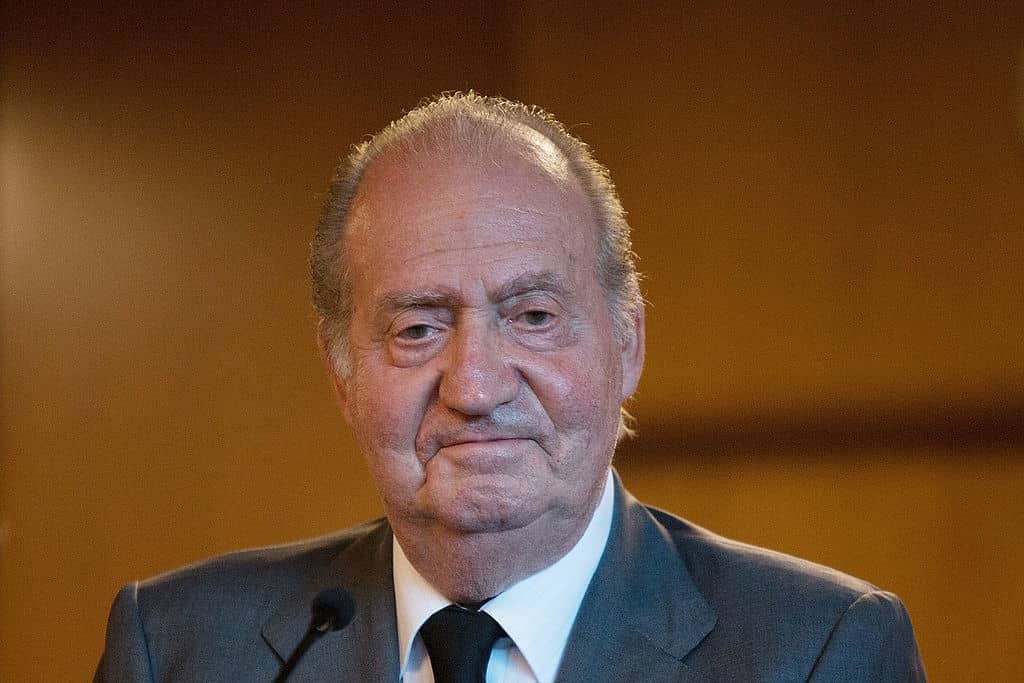Juan Carlos, Spain’s exiled former king, will be present at Queen Elizabeth II’s funeral in London on Monday – and the Spanish government is furious. Socialist prime minister Pedro Sanchez has reportedly tried to stop the ex-monarch from attending and a spokesperson for Podemos, the coalition’s junior partner, has described him as a ‘criminal on the run’. But the 84 year-old emeritus king, who abdicated in 2014 and fled Spain in 2020 under suspicion of fraud, is attending anyway, along with his wife, former Queen Sofia.
He is right to do so. Juan Carlos’s attendance at Monday’s state funeral isn’t just a personal affair, separate from the controversy surrounding his alleged misdemeanors – it’s a family matter. Spain’s still popular former king and his wife Sofia are great-great-grandchildren of Queen Victoria, as were Elizabeth and her husband Prince Philip, Duke of Edinburgh. The current Spanish monarch and Juan Carlos’s son, king Felipe VI, referred to Elizabeth as ‘Aunt Lillibet’ and was 567th in line to the British throne at the time of her passing.
To quash rumours of a clandestine intervention to prevent Juan Carlos travelling to London, the Spanish government’s spokeswoman Isabel Rodriguez convened a press conference last week. Rodriguez pointed out that the former monarch had received a ‘private invitation’ to the occasion (from the British Foreign Office), thus implying that the Socialist-led coalition had no business interfering in his acceptance of it.
The emeritus king fled Spain for Abu Dhabi on August 3rd and has returned home just once since
She also reiterated that the official Spanish delegation on Monday will be led by king Felipe VI and his wife Queen Letizia (a frequent star of adoring, photo-heavy features in the Daily Mail). The message was clear: Juan Carlos will not be representing the Spanish state in any way whatsoever when he shows up in London on Monday – a role that will be performed solely by the reigning king and queen.
Queen Elizabeth’s funeral might be a family affair for Spanish royals, but Felipe is unlikely to be thrilled that his father will attend on Monday. In March 2020, reports revealed that Juan Carlos’s son was a beneficiary of an offshore fund established by his father in 2008. In an act of reputational distancing, Felipe renounced his personal inheritance and stripped Juan Carlos of his annual state stipend, worth almost £200,000.
Relations between father and son worsened four months later, when it emerged that Swiss and Spanish authorities were investigating allegations that Juan Carlos engaged in fraudulent activity in the latter years of his reign (1975 to 2014). The emeritus king fled Spain for Abu Dhabi on August 3rd and has returned home just once since, to attend a regatta in Galicia in May this year.
Ever since the fraud scandal broke, prime minister Sanchez has maintained a tough stance on Juan Carlos’s alleged wrongdoings, saying that he ‘owes Spaniards some explanations’. It has become increasingly clear, though, that the former king disagrees: when cornered by a journalist at the regatta and asked whether he’d be offering his son any explanations ahead of an imminent visit to the Royal Palace, Juan Carlos flippantly replied, ‘explanations of what?’ His mere presence at the event incensed one half of the coalition, with Podemos tweeting that ‘anyone who returned to our country with the history of king Juan Carlos would be arrested as soon as they crossed the border and brought to justice’.
The regatta took place months after the Swiss and Spanish investigations were shelved due to ‘insufficient evidence’, the statute of limitations and Juan Carlos’s possession of legal immunity before his abdication in 2014 (triggered by a badly-timed hunting trip to Botswana). But the former king, who’s still revered for his role in re-introducing democracy to Spain after the death of fascist dictator Francisco Franco in 1975, isn’t in the clear: in a case that might go to trial in London’s High Court, he faces harassment accusations made by his former lover Corinna zu Sayn-Wittgenstein, also known as Corinna Larsen, a Danish socialite and businesswoman.
The private-public distinction that can be deployed to justify Juan Carlos’s presence in Westminster Abbey on Monday is also central to this ongoing case. In pre-trial hearings earlier this year, Juan Carlos’s barrister argued that his client is still an ‘essential part of the Constitutional fabric of Spain’ and that he therefore retains a vestige of sovereign immunity.
Countering, Sayn-Wittgenstein’s lawyer claimed that the allegations of harassment conducted in 2012 concerned private acts not covered by sovereign immunity, either then or now. In any case, he pointed out, Juan Carlos abdicated the throne almost a decade ago and renounced all his official duties in 2019. The judge agreed and said the case could go to trial, but Spain’s emeritus king is appealing the decision.
The distinction between Juan Carlos the king or ex-king and Juan Carlos the man, then, has a sting to it. Spain’s former monarch can’t relinquish the burden of kingship without also being stripped of its protections: if he is allowed to attend his distant cousin’s funeral on Monday in a private, personal capacity (which he should), he ought to face Sayn-Wittgenstein’s accusations in court for precisely the same reason.






Comments